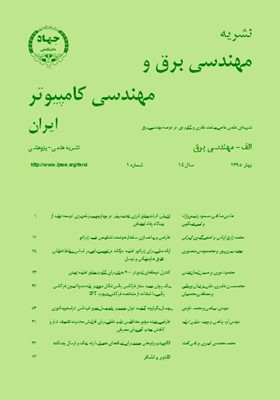ارزیابی اثرات منابع انرژی تجدیدپذیر در چهارچوب برنامهریزی توسعه تولید از دیدگاه رفاه اجتماعی
محورهای موضوعی : مهندسی برق و کامپیوترهادی صادقی 1 , مسعود رشیدینژاد 2 , امیر عبداللهی 3
1 - دانشگاه شهید باهنر کرمان
2 - دانشگاه شهید باهنر کرمان
3 - دانشگاه شهید باهنر کرمان
کلید واژه: برنامهریزی توسعه تولید برنامهریزی غیر خطی آمیخته با اعداد صحیح رفاه اجتماعی منابع تجدیدپذیر,
چکیده مقاله :
امروزه بر همگان مبرهن است که تغییرات شرایط آب و هوایی تهدیدی جدی برای رفاه بشر بر روی کره زمین تلقی میشود، از این رو رشد روزافزون تقاضا برای انرژی الکتریکی و وابستگی بخش تولید به منابع سوختهای فسیلی، این بخش را به یکی از مهمترین حوزهها برای اعمال محدودیتها و پیادهسازی راهکارها در راستای کاهش انتشار گازهای گلخانهای مبدل نموده است. از جمله این راهکارها، تدوین طرحهایی تحت عنوان سیاستهای تشویقی است که ترویج منابع انرژی تجدیدپذیر و اعمال محدودیت بر انتشار بخش تولید را دنبال میکنند. در مقاله پیش رو با تکیه بر مفهوم تابع رفاه اجتماعی برگسون- ساموئلسون، اثر افزایش درصد نفوذ منابع انرژی تجدیدپذیر تحت اجرای سیاستهای تشویقی در برنامهریزی بلندمدت توسعه تولید از دیدگاههای مختلفی چون مسایل زیستمحیطی، رفاه سرمایهگذاران بخش تولید و رفاه مصرفکنندگان انرژی الکتریکی مورد ارزیابی قرار میگیرد. بدین منظور ابتدا با در نظر داشتن اثر یکی از رایجترین سیاستها تحت عنوان سیاست حق انتشار با قابلیت داد و ستد، یک مدل جامع برای برنامهریزی توسعه تولید از دید یک شرکت تولیدی ارائه میگردد. مدل مزبور در قالب یک مسأله غیر خطی آمیخته با اعداد صحیح با استفاده از نرمافزار بهینهسازی گمز، طی دو سناریو حل میگردد. سپس با توجه به استراتژیهای بهینه به دست آمده برای توسعه، به بررسی دیدگاههای مطرحشده پرداخته خواهد شد.
Nowadays, it is clear to everyone that climate change has posed a huge threat to human welfare. Hence, the growth of demand for electricity as well as the dependence of power sector to the fossil fuel sources has converted the electrical energy sector into one of the most important areas suitable for applying the restrictions and implementation of the solutions provided to mitigate greenhouse gases. Enacting different incentive-based support schemes pursuing the promotion of renewable energy sources along with emission reduction in power generation sector is treated as one the main provided solutions. In this paper, from various points of view, such as environmental issues, power sector investors’ profit and the surplus of electricity consumers, the effect of renewable penetration rate growth under implementation of incentive-based policies is evaluated in a long-term generation expansion planning framework by employing the concept of Bergson-Samuelson social welfare function. To achieve this aim, first, a comprehensive generation expansion planning model, faced by a generation company, is proposed, as the effect of one on the most popular policies, namely emission trading system, is incorporated into the model. As a mixed integer nonlinear programming problem, the model is solved through two different scenarios using the GMAS optimization package. Then, regarding the obtained optimized expansion strategies, aforementioned viewpoints are assessed.
